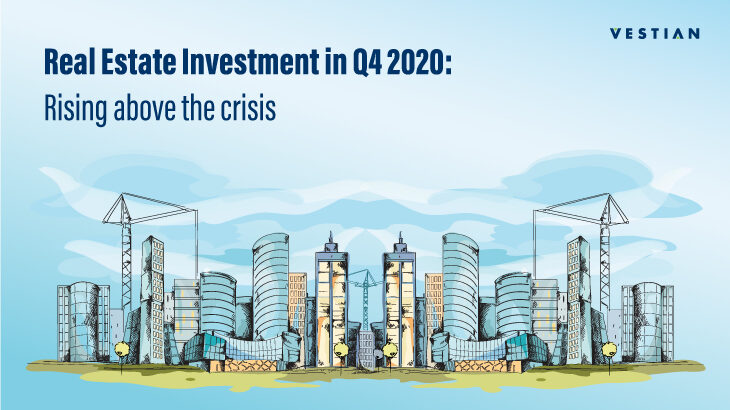Real estate is undoubtedly one of the key decisive sectors impacting the growth of a country’s economy. The fact that a robust real estate sector aids in strengthening a host of other ancillary sectors holds much import for a developing economy. Over the span of a decade, India’s real estate sector has witnessed a paradigm shift in all aspects – right from a regulatory environment that has observed radical changes, to the emergence of alternative avenues of investment as well as a new era of structured finance.
In tandem with the growth and development of real estate sector of the country, real estate investment in India too has observed major changes. One of the major trends observed in the last decade has been the rise in institutional investment in real estate, particularly that of private equity (PE) investment, a key factor that has kept the market confident about its revival. Today, with the current unprecedented scenario of the COVID-19 crisis, institutional investment in real estate has become the cynosure of all eyes as the sector struggles to stay afloat.
Real estate investment witnesses an upsurge during Q4 2020
Contrary to expectations, in a pandemic-induced constricted environment, the period Q4 2020 (October-December 2020) saw announced investment value of USD 4,965 million in the Indian real estate sector. This depicted a significant increase of 195% as compared with the quantum of investment a year ago in Q4 2019. Another notable point that came to light was the concentration of foreign funds in Q4 2020, their share of investment volume recorded at 98%. In contrast, the corresponding period in 2019 showed a relatively lesser share of 89% of total investment being accounted for by foreign funds, India-dedicated funds accounting for 11% share.
The upsurge in institutional investment in real estate during Q4 2020 can be largely attributed to the fact that most of these deals were on hold during the first half of year, continuing till the third quarter, on account of insecurities created by the COVID-19 predicament. A large number of these deals were on the verge of closing when the pandemic struck and delayed the process, the closure eventually spilling over to Q4 2020.
Landmark deals hold up confidence in the real estate sector
A number of large sized deals were inked in Q4 2020, thus accounting for the considerable rise in investment volume during the period. Mention can be made of Bengaluru-headquartered RMZ Corp that struck a deal to sell a major portion of its office and co-working assets to Canadian investor Brookfield Asset Management for nearly USD 2 billion – the largest deal in the country’s real estate market. Coming a close second, Blackstone, one of the biggest owners of commercial real estate in the country and the first REIT in India, signed a term sheet with Bengaluru-developer Prestige Project Estates for its office, retail and hotel assets, valued at around USD 1.5 billion.
Other notable deals during Q4 2020 involved Singapore-headquartered sovereign wealth fund GIC Pte Ltd and ESR Cayman Ltd, an Asia-Pacific-focused logistics real estate firm, forming a joint venture to develop and buy industrial and logistics assets worth USD 750 million in India, while Canadian real estate investment firm BentallGreenOak entered into an agreement with Piramal Realty to acquire part of its commercial development in Mumbai for more than USD 136 million.
Commercial segment remains the preferred asset class
One of the major trends observed in the recent years has been the emergence of the commercial assets segment as the most preferred segment to attract investor interest. Factors such as development of Grade A commercial space and fairly reasonable rentals, coupled with low vacancy levels, have led the commercial segment to emerge as the investors’ favourite asset class. The COVID-19 crisis notwithstanding, institutional investment in commercial assets accounted for 53% share of the total quantum invested in real estate in Q4 2020. Investment in mixed-use developments and logistics accounted for 45% share, while the residential segment attracted a mere 2% share during the quarter.
Bengaluru leads the way in investment volume
Interestingly, Bengaluru accounted for the highest share of institutional investment in real estate during Q4 2020, of over 57% of the total investment, followed by Mumbai with 29% share. In the corresponding quarter in 2019, Mumbai had been leading with 58% share of the total investment. The two largest deals of the country – Brookfield investing in RMZ Corp and Blackstone in Prestige Estates, are primarily responsible behind Bengaluru leading the charts in Q4 2020 as both investee companies have their headquarters as well as the lion’s share of assets in Bengaluru.
Outlook
The continued confidence and interest of institutional investors in the country’s real estate, has come as a ray of light in an otherwise beleaguered sector. It reaffirms the fact that the real estate industry of the country is ruled by strong fundamentals and is resilient enough to remain one of the prime business destinations of the world. Government measures, too, have been adequately supportive in order to attract more investors into the fold. However, going forward, with a number of risk factors arising in the real estate industry such as extended timelines of constructions/project completions due to lack of labour availability, impact on sales and long wait for approvals, institutional investors would be cautious in choosing the developers and projects for funding.
On the other hand, domestic and foreign funds will take an opportunistic view in the forthcoming period and it is expected that there will be significant competition in pursuing safe deals with competitive rates, in the near future. There is likely to be an increase in investments in emerging assets classes such as industrial, warehousing and logistics, data centers as well as affordable housing. If the investment quantum achieved in Q4 2020 is anything to go by, the forthcoming period in 2021 would see a larger involvement of institutional investors in the country’s real estate, abetted by economic improvement and containment of the pandemic through a structured vaccination programme.
